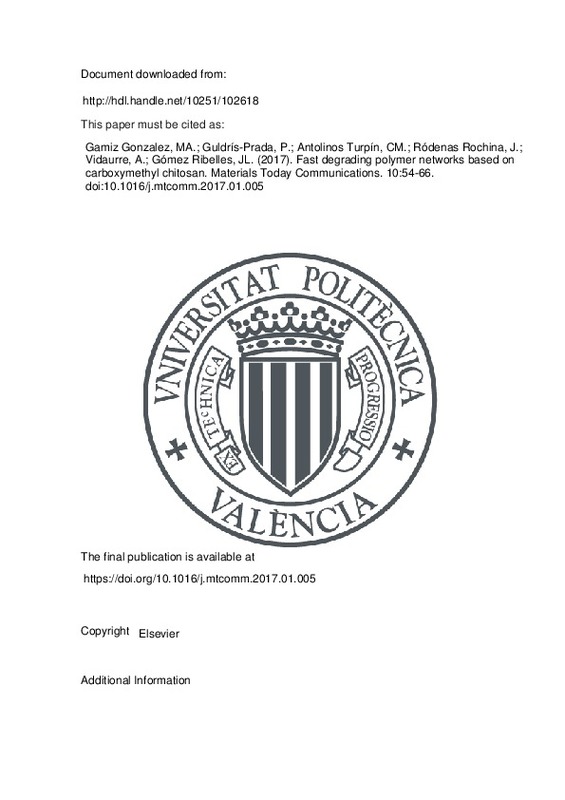JavaScript is disabled for your browser. Some features of this site may not work without it.
Buscar en RiuNet
Listar
Mi cuenta
Estadísticas
Ayuda RiuNet
Admin. UPV
Fast degrading polymer networks based on carboxymethyl chitosan
Mostrar el registro sencillo del ítem
Ficheros en el ítem
| dc.contributor.author | Gámiz González, Mª Amparo
|
es_ES |
| dc.contributor.author | Guldrís-Prada, Paula
|
es_ES |
| dc.contributor.author | Antolinos Turpín, Carmen María
|
es_ES |
| dc.contributor.author | Ródenas Rochina, Joaquín
|
es_ES |
| dc.contributor.author | Vidaurre, Ana
|
es_ES |
| dc.contributor.author | Gómez Ribelles, José Luís
|
es_ES |
| dc.date.accessioned | 2018-05-25T04:22:59Z | |
| dc.date.available | 2018-05-25T04:22:59Z | |
| dc.date.issued | 2017 | es_ES |
| dc.identifier.uri | http://hdl.handle.net/10251/102618 | |
| dc.description.abstract | [EN] In this work macroporous membrane for mesenchymal stem cells, MSCs, transplant has been developed. The membranes support cell seeding and proliferation and completely degrade in less than one week in "in vitro" culture. The biodegradable material is a polymer network based on carboxymethyl chitosan( a water soluble modification of chitosan) crosslinked by poly(epsilon-caprolactone) PCL, fragments which are susceptible to hydrolytic degradation. Synthesis was performed in solution in a common solvent for the two components of the network. The gel fraction was assessed by extraction in selective solvents. Physical characterization of networks of varying composition included water sorption capacity and the crystallinity of poly(epsilon-caprolactone) in the network. In this way polymer networks are synthesized that lose between 66 +/- 5% and 89 +/- 1% of their mass when immersed in water for 28 days. The same weight loss is attained in enzymatic medium in only 4 days. Porcine bone marrow MSCs were seeded in macroporous membranes to show cell viability, and proliferation up to 7 days culture when the biomaterial is completely dissolved in the medium. | es_ES |
| dc.language | Inglés | es_ES |
| dc.publisher | Elsevier | es_ES |
| dc.relation.ispartof | Materials Today Communications | es_ES |
| dc.rights | Reserva de todos los derechos | es_ES |
| dc.subject | Fast degradation | es_ES |
| dc.subject | Mesenchymal stem cells | es_ES |
| dc.subject | Carboxymethyl chitosan and poly(epsilon-caprolactone) block-copolymer networks | es_ES |
| dc.subject | Thermal stability | es_ES |
| dc.subject.classification | INGENIERIA QUIMICA | es_ES |
| dc.subject.classification | TERMODINAMICA APLICADA (UPV) | es_ES |
| dc.subject.classification | FISICA APLICADA | es_ES |
| dc.subject.classification | MAQUINAS Y MOTORES TERMICOS | es_ES |
| dc.title | Fast degrading polymer networks based on carboxymethyl chitosan | es_ES |
| dc.type | Artículo | es_ES |
| dc.identifier.doi | 10.1016/j.mtcomm.2017.01.005 | es_ES |
| dc.rights.accessRights | Abierto | es_ES |
| dc.date.embargoEndDate | 2019-03-01 | es_ES |
| dc.contributor.affiliation | Universitat Politècnica de València. Departamento de Física Aplicada - Departament de Física Aplicada | es_ES |
| dc.contributor.affiliation | Universitat Politècnica de València. Departamento de Termodinámica Aplicada - Departament de Termodinàmica Aplicada | es_ES |
| dc.description.bibliographicCitation | Gamiz Gonzalez, MA.; Guldrís-Prada, P.; Antolinos Turpín, CM.; Ródenas Rochina, J.; Vidaurre, A.; Gómez Ribelles, JL. (2017). Fast degrading polymer networks based on carboxymethyl chitosan. Materials Today Communications. 10:54-66. doi:10.1016/j.mtcomm.2017.01.005 | es_ES |
| dc.description.accrualMethod | S | es_ES |
| dc.relation.publisherversion | https://doi.org/10.1016/j.mtcomm.2017.01.005 | es_ES |
| dc.description.upvformatpinicio | 54 | es_ES |
| dc.description.upvformatpfin | 66 | es_ES |
| dc.type.version | info:eu-repo/semantics/publishedVersion | es_ES |
| dc.description.volume | 10 | es_ES |
| dc.identifier.eissn | 2352-4928 | es_ES |
| dc.relation.pasarela | S\325044 | es_ES |







![[Cerrado]](/themes/UPV/images/candado.png)

